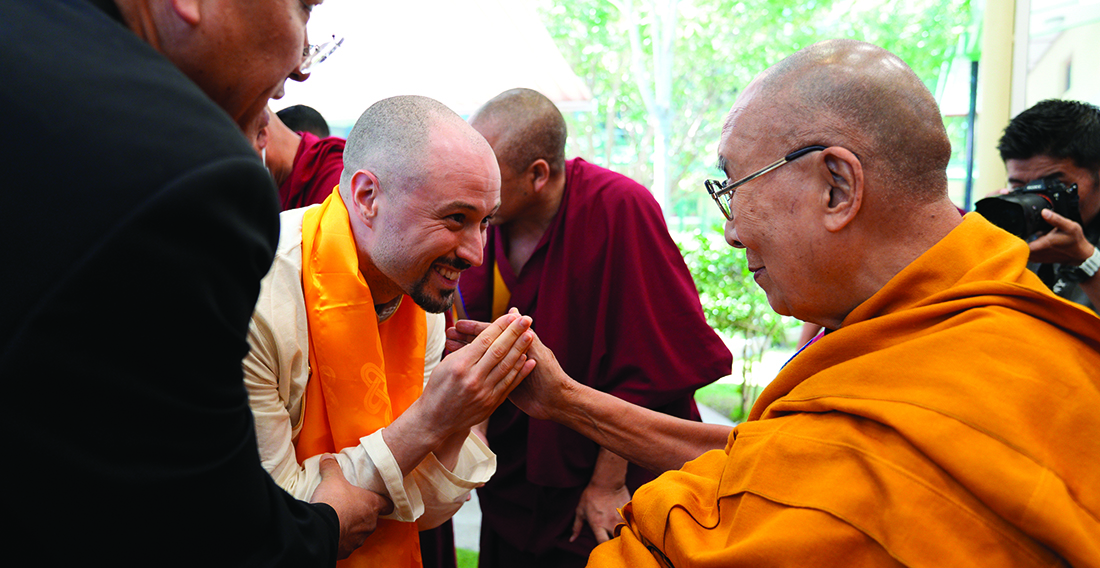The Power of Perspective
Dalai Lama blessing highlights transformational learning abroad

Professors Jed Forman and Aswati Subramanian believe one part of a professor’s role is to create life-changing experiences. The May Term course they led in India this spring certainly fits that category. During the 18-day trip, 14 students and two parents explored India with a focus on the diaspora of Tibetan people within the country. Along the way, they had the thrill of meeting His Holiness, the 14th Dalai Lama, Tenzin Gyatso.
“Everything we did was so special, but it is almost impossible to beat the blessing we received from the Dalai Lama,” said student Memphis Dunsdon ’26 in an interview with the Des Moines Register. “I do not consider myself to be very religious but from understanding the history of the Dalai Lama and the things he has done, this blessing meant the world to me, and it is something I will cherish forever.”
Making the May Term
Forman, the Robert H. N. Ho Family Foundation assistant professor of Buddhist Studies, knew he wanted to make this trip happen before coming to Simpson. “When I was living in India doing my Ph.D. work, one of my mentors had a study abroad program in central India and I saw how amazing it was for the students. So, when I was being interviewed, they asked what I would like to do if I came to Simpson, and [this trip] was one of the first things I said.”
He began planning the trip with the help of Professor Subramanian, who was born and raised in India. “I lived in India for the first 11 years of my life, went to the Middle East, then went back to India for my undergrad and master’s. It is my home,” said Subramanian. Though not born and raised there, Forman lived in India for 15 months during his studies and has returned every year to a monastery in the South called Sera Jey.
Forman’s connections from his time at Sera Jey played a huge role in planning the May term course. Leveraging those connections, Forman arranged for the incredible opportunity for students to stay at Sera Jey and ultimately receive a blessing from the Dalai Lama.
The Visit of a Lifetime
Meeting the Dalai Lama was an extraordinary experience for everyone. “It was emotional,” said Forman. “I’ve seen the Dalai Lama on several occasions, even back when I was a teenager in Massachusetts, but always from afar. This was my first time having a face-to-face encounter. It really felt like a culmination of years and years being immersed in this tradition, and now to have this moment, it was meaningful for me.”
Though she had lived in India for a combined 15 years, Subramanian had also not yet met the Dalai Lama. But when she did, she was speechless. “We had all rehearsed a line or two to greet him, but when you’re there and seeing his face, you just forget everything. It was surreal.”
The students had similar reactions, including Bella Tranquilino ’24. “I almost blacked out,” said Tranquilino. “I was super nervous but also very excited at the same time. The best way to describe it is surreal.”
Forman took great pride in watching how the students handled the experience. “They understood the gravitas of it,” said Forman. “I was really proud of them. The way they conducted themselves, they really understood how rare an opportunity that was.”
More Than a Moment
Meeting the Dalai Lama was the highlight for many students, but there was so much more to the trip. Subramanian wanted to be sure the students saw more than one piece of the country’s culture to give them a more authentic vision of the country.
“I wanted the students to experience a contrast from the slow and peaceful monastic lifestyle because that’s not the India most people are used to,” said Subramanian. “We did a week in Sera Jey, and then we went to Bangalore, which is a major city. We then traveled to Dharamsala, a northeastern city in the foothills of the Himalayas. It was important for the students to see three different sites, so they didn’t just have a monochromatic view of the country. Having said that, even covering three cities doesn’t give a comprehensive view of India.”
They also had the chance to trek the Himalayas, which was a surprisingly calming moment for Tranquilino. “One of the best parts was hiking in the Himalayan mountains because you always hear about them, but it’s very rare for people to experience them. And I have a deep love for nature. Being at such a high elevation but still feeling grounded is an experience you could only dream about.”
Forever Changed
Given the magnitude of the mountaintop moments experienced in such a profoundly different culture, students had so much to process. Returning home, they needed to unpack more than their suitcases.
“When we got back, some of the students asked to meet up to process what they were going through,” said Subramanian. “They fully realized the magnitude of their experience. They felt something authentic was missing in their lives back home. The trip pushed them to think about what they could do differently.”
Forman explained that experiencing new cultures can be “destabilizing,” but he doesn’t believe that is a bad thing. “They started asking big questions and reevaluating what’s important to them,” said Forman. “A lot of them said, ‘I’m really thinking differently about what I want to do with my life and what is important to me.’ To be bombarded with something so different can make you reflect on what was taken for granted before.”
Forman and Subramanian believe the mind’s expansion through these new experiences is essential for true growth. They say Simpson faculty understand and encourage this through classroom exercises and study abroad experiences.
“I think what a good teacher does is really instill a sense of curiosity,” said Forman. “At Simpson, our faculty can instill that wonder in students and investment in getting interested in the world. When you get that opportunity to be in another country, and you can take a step back, you really come away with a new perspective.”
Article Information
Published
January 4, 2025
Author
Alisa Reynolds-Good
Department
Department of History, Philosophy, and Religion

